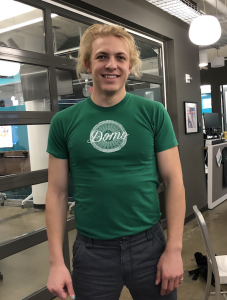Author: Martin Trust Center
MIT’s Storyteller In Residence, Dom Smith chats to serial entrepreneur, and MIT student Alexander List about his current, and previous ideas, and offers up some key tips when understanding mental health issues within the entrepreneurial ecosystem.

Can you tell me a bit about what you do here?
Sure, my name is Alex List, and currently I am a Masters of Engineering Student in Electrical Engineering and Computer Science here at MIT, I was also an undergrad. When I first got to the Martin Trust Center, I was a freshman. I started a small company in High School, as well as having worked on some cool projects in the Media Lab, there was something that I called Entrepreneurs Anonymous which was a round table for people working on projects. We would come together and share what we were working on, a lot of them ended up getting funded and going on to Y-Combinator.
I was working on a project called Swipe, and this allowed people to drag pictures or files from any app to any device simply by physically dragging it over, from one phone to another phone for example. Fast-forwarding, in my Sophomore year, I built a project called Domo, which provided mental health resources for students on campus. The idea was that people could get anonymous advice from people who care – either at a school, or a company.
What are your biggest challenges?
After my Junior year, I dropped out of MIT and got into TechStars here in Boston. I ran a company with around five people in it – it was called Magnet, and we sold bracelets for people in long distance relationships – when I would tap on my Magnet bracelet, my girlfriend would feel hers vibrate and it would light up in a pattern; then she would know that I was thinking about her. I dropped out of MIT for a year-and-a-half to run with this idea that you could have this telepathy between two people who were wearing multiple devices. Ultimately I ran out of investor money, and I couldn’t raise more, I did some work for other people and then came back to MIT. The biggest challenge I have now, is trying to find out what to work on next!
Have you always had that entrepreneurial spark?
I learned to program in Middle School, and then I got an iPhone in my Freshman year, and I couldn’t justify purchasing an iPhone unless I actually programmed for it. I felt like such a user, instead of a developer.
I launched my first app in my Sophmore year, and it became a top ten app on the App Store, that was called Placebook, and that would allow you to save your favorite places, and share them with your friends. For me back then selling an app for 3.99 did me quite well in terms of the amount of sneakers I could buy.
What would you say that your core values are?
If you’re going to be working with other people then you have to treat those people well. Pay your employees as quickly as possible, as that’s a major way to let people know that you value their work. In terms of values in the work that I do, it has to do with a combination of things that I find to be fun – I find trying to enable telepathy to be fun, plus it has to incorporate ways that I feel I’m going to improve society, otherwise I don’t feel any motivation to do it. Transportation and space are also really fun. It’s also about learning new things for me.
What are some key tips from you as an entrepreneur?
You can really build a company if you try to build one order of magnitude at a time, if you try to climb the ladder too many rungs at a time, it’s really possible that you will fall. I’m also going to go ahead and say there are a lot of mental health issues, within the entrepreneurial community. When you are trying to raise money, it can be a really lonely and difficult time. We had a list of 100 people that I was supposed to reach out to when we were launching our product, and every day you are getting rejected, not everyone responds, less than 10 per cent in fact, and that is really difficult. I mean, I dropped out of MIT to support the company [Magnet], so it’s obviously something that I cared a lot about, and if it doesn’t go well, then it can be a cause for a lot of stress. People not only have to admit mistakes, but admit that it’s really hard [to be an entrepreneur]. It’s important to talk to your friends, and the best kind of friends to help in these situation are other entrepreneurs. I think it makes you a much more experienced entrepreneur when you learn to go through failure.
Listen to the full interview here:


Follow